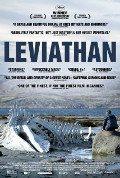
Directed by
Andrey Zvyagintsev
140 minutes
Rated M
Reviewed by
Bernard Hemingway

Leviathan
Synopsis: Kolya (Alexey Serebryakov) lives in a drab provincial coastal town near the Barents Sea in Northern Russia. The family home which he shares with his younger second wife Lilya (Elena Lyadova) and his teenage son from a previous marriage is under threat as the town mayor (Roman Madyanov) has slapped a compulsory acquisition order on Kolya's land. Kolya enlists the help of an ex-army buddy, Dmitri (Vladimir Vdovitchenkov), now a Moscow lawyer, but things don’t turn out the way he had hoped.
In terms of content, with its story of an ordinary working man fighting City Hall, Andrey Zvyagintsev’s film is social realist but as the title and the short prologue, with its images of waves ceaselessly pounding the rocky shore to the accompaniment of Philip Glass’s music, indicates, its reach is much more extensive. Indeed, whilst the events have a specific historical setting one feels that Leviathan is a paradigmatically Russian story, one that could have taken place in the days of Tsar Nicholas or Josef Stalin as much as those of Vladimir Putin. It is a story of brutal authoritarianism and a put-upon people whose only solace for their powerlessness is religion and alcohol-induced oblivion, either singly or together. The film’s title then, taken from the Old Testament's Book of Job, perhaps refers to an ancient, gargantuan monster on which the feeble efforts of any ordinary mortal can have no effect, a suggestion reinforced by the film’s epilogue returning to the image of that same brutally indifferent ocean pounding a barren rocky shore.
No doubt the film would resonate much more strongly with a home audience (Zvyagintsev is clear with his references to Communist-era conformism and Putin-era opportunism) but we can readily grasp the director’s deep despair at what his country has become. The final scene of the Orthodox priest in all his finery intoning pious words about Christian love and honesty as the piggish lout of a mayor listens on with sanctimoniously hypocritical approval is bitterly disheartening to say the least.
Indeed Zvyagintsev does everything to make sure that we don’t experience any vicarious pleasure from his film. There is sex and violence in it but it largely happens off screen and all we see are its destructive effects, the settings are desultory, photographed with a largely blue-grey palette and what happiness there is is invariably found at the bottom of a vodka bottle.
For all its solemnity Leviathan is at times very amusing, particularly in its depiction of Kolya and his small circle of easy-going, hard-drinking friends. Even Kolya’s tilting at the powers-that-be are given a somewhat absurdist twist as he tries to navigate the Byzantine bureaucracy and its corrupt and callous incumbents.
But at its heart is a profound sense of defeat. Because of this, Leviathan is not a readily consumable film but with its pained compassion and Zvyagintsev’s masterly film-making skills it is a substantial one.

Want more about this film?


Want something different?




